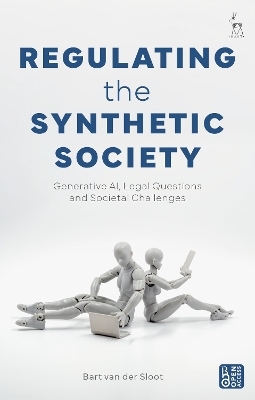
Regulating the Synthetic Society
Generative AI, Legal Questions, and Societal Challenges
Seiten
2024
Hart Publishing (Verlag)
978-1-5099-7494-8 (ISBN)
Hart Publishing (Verlag)
978-1-5099-7494-8 (ISBN)
This open access book provides an introduction to Generative Artificial Intelligence and four cutting-edge technologies that it enables - humanoid robots, deepfakes, augmented reality, and virtual reality.
Experts predict that in five years’ time, more than 90 per cent of all digital content will be wholly or partially AI generated. In a synthetic society, it may no longer be possible to establish what is real and what is not. Although they are only in their relative infancy, these technologies can already produce content that is indistinguishable from authentic material. The impact of this new reality on democracy, the judicial system, the functioning of the press, as well as on personal relationships, might be unprecedented.
The author describes the inner workings of each of these technologies and maps their positive uses in the fields of education, health and entertainment; conceptualises their negative uses for fraud, deception, exploitation and identity-theft; and explores their deeper effects on the post-truth society, the privatisation of the public sphere, and the loss of individual autonomy and societal trust.
The book evaluates how the current European legal paradigm applies to these technologies, focussing on the right to privacy and data protection, intellectual property, freedom of expression, procedural law, tort law, consumer and competition law, and the regulation of AI. It discusses regulatory alternatives to solve existing regulatory gaps and shows that there are no easy answers.
Experts predict that in five years’ time, more than 90 per cent of all digital content will be wholly or partially AI generated. In a synthetic society, it may no longer be possible to establish what is real and what is not. Although they are only in their relative infancy, these technologies can already produce content that is indistinguishable from authentic material. The impact of this new reality on democracy, the judicial system, the functioning of the press, as well as on personal relationships, might be unprecedented.
The author describes the inner workings of each of these technologies and maps their positive uses in the fields of education, health and entertainment; conceptualises their negative uses for fraud, deception, exploitation and identity-theft; and explores their deeper effects on the post-truth society, the privatisation of the public sphere, and the loss of individual autonomy and societal trust.
The book evaluates how the current European legal paradigm applies to these technologies, focussing on the right to privacy and data protection, intellectual property, freedom of expression, procedural law, tort law, consumer and competition law, and the regulation of AI. It discusses regulatory alternatives to solve existing regulatory gaps and shows that there are no easy answers.
Bart van der Sloot is Associate Professor at the Tilburg Institute for Law, Technology & Society, Tilburg University, the Netherlands.
1. A Map to this Book
2. Applications and Effects of Synthetic Technologies
3. Under the Hood: Architecture and Design of Synthetic Technologies
4. Societal Challenges
5. Law
6. Uneasy Questions and Imperfect Solutions
| Erscheinungsdatum | 20.02.2024 |
|---|---|
| Verlagsort | Oxford |
| Sprache | englisch |
| Maße | 138 x 216 mm |
| Themenwelt | Recht / Steuern ► EU / Internationales Recht |
| Recht / Steuern ► Privatrecht / Bürgerliches Recht ► IT-Recht | |
| ISBN-10 | 1-5099-7494-6 / 1509974946 |
| ISBN-13 | 978-1-5099-7494-8 / 9781509974948 |
| Zustand | Neuware |
| Haben Sie eine Frage zum Produkt? |
Mehr entdecken
aus dem Bereich
aus dem Bereich
Telekommunikations- und Multimediarecht
Buch | Softcover (2024)
dtv Verlagsgesellschaft
27,90 €
Datenschutz-Grundverordnung Bundesdatenschutzgesetz
Buch | Hardcover (2024)
C.F. Müller (Verlag)
200,00 €
datenschutzrechtliche Ansprüche durchsetzen und verteidigen
Buch | Softcover (2024)
Deutscher Fachverlag GmbH
89,00 €


